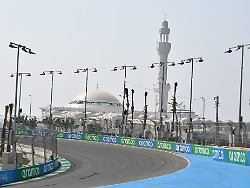Thursday, December 02, 2021
Premiere at the Black Sheep
Does Formula 1 wash Saudi Arabia clean?
Formula 1 is about to have another premiere: after the race in Qatar, it’s now up to Saudi Arabia. The criticism is even bigger than it was two weeks ago. Formula 1 is accused of participating in sportswashing. The country holds against it.
The first Formula 1 race in Saudi Arabia even became a story for the Washington Post. “Don’t sing for the murderers of my beloved Jamal,” pleaded Hatice Cengiz, the fiancée of the journalist Khashoggi, who was killed in 2018, in a guest post addressed to Justin Bieber. The Canadian is one of several music greats that the highly controversial kingdom bought in to add even more glamor to the country’s biggest sporting event to date.
There is no lack of criticism when Formula 1 moves on after the Qatar detour to the penultimate and possibly World Cup decisive race of the season in Jeddah (Sunday, from 5:15 p.m. on RTL and in the ntv.de live ticker). Amnesty International draws attention to the “extremely worrying human rights record” in Saudi Arabia, laments the crackdown on activists – and of course the “notorious murder” of regime critic Khashoggi.
In 2019, the organization counted 184 executions, some of them publicly carried out. Added to this is the repression of dissidents, human rights activists and clergy. The toleration of homosexuality, religious freedom and equality are “strongly endangered or not available”. Migrant workers reported abuse and exploitation. How does that fit with Formula 1, which campaigns for equality at every race with the slogan “We Race As One”?
Alienate wealthy customers?
The racing series’ contracts with Qatar and Saudi Arabia contained guarantees that the countries would have to respect human rights in all aspects of their connection with sport, Formula 1 managing director Stefano Domenicali recently told the BBC. If you disregard it, you have the right to rescind the contract. However, stressed the Italian, “the spotlight that we bring will be beneficial for the will and the desire for change”.
In addition, Formula 1 is reluctant to alienate wealthy customers. That was the case under Bernie Ecclestone, but nothing has changed at Liberty Media (since 2017). Manufacturers would also like to sell cars in these markets.
The relationship between Formula 1 and Saudi Arabia is even particularly close. At the beginning of 2020, a lucrative deal was signed with the state-owned company Aramco. The company is the largest oil company in the world – and is one of the largest CO2 emitters on the planet. Shortly thereafter, the agreement on a Grand Prix followed, in 2021, although there was still no adequate racetrack.
Prince defends himself against sport washing
In 2023 there will be two for this: The high-pressure course in Jeddah, which will be used on Sunday and March 27, 2022, and the even more spectacular route that is currently being built together with the mega-entertainment complex Qiddiya at the gates of Riyadh. Formula 1 has signed a ten-year contract with Saudi Arabia for allegedly 800 million euros. This ensures high income for the racing series, and the kingdom can also look forward to regular TV presence in a positive context. The Dakar Rally, the Spanish and Italian Super Cups, wrestling events, Formula E or world championship matches in boxing (Joshua vs. Ruiz II, “Clash on the Dunes”) were already in the country.
Critics call it sportwashing, but Prince Abdulaziz bin Abdullah Al Saud says, referring to the royal family’s allegedly billion-dollar investment in “Vision 2030”: “The government has understood that sport plays a very important role in the future of young people.” The country wants to become more independent of oil, diversify the economy and also attract tourists. The pictures of racing Formula 1 racing cars in holiday weather along the Red Sea should help.
